Explainer: Where things stand for Afghanistan as Ghani visits US
The Afghan president begins a visit to Washington as the Taliban makes huge advances across the war-ravaged country.
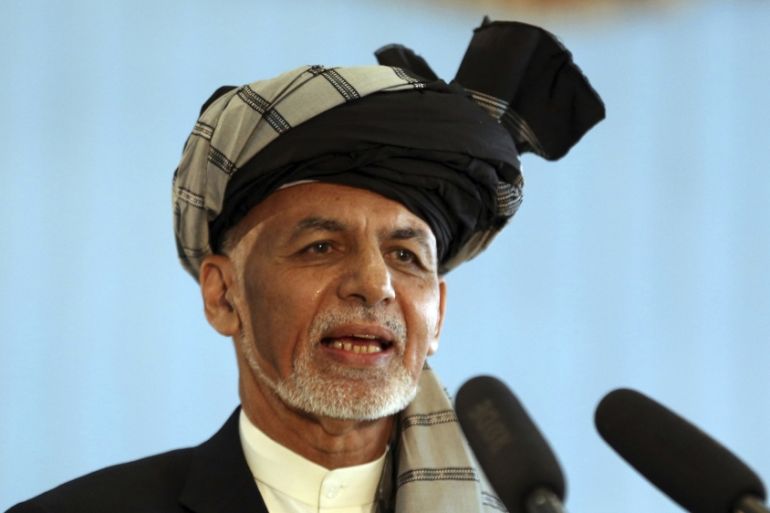
Afghan President Ashraf Ghani begins a visit to the United States at a time when the Taliban is making huge advances across the country.
There are fears that already-demoralised Afghan security forces will be swiftly overrun when the remaining American troops withdraw. And peace talks between the Taliban and the Afghan government remain stalled.

Keep reading
‘spoilers’ in afghan talks: pakistan nsa in veiled dig at india, pakistan’s khan fears ‘civil war’ if no peace deal in afghanistan, turkey’s troops should leave afghanistan under 2020 deal: taliban, afghanistan’s babies.
Here are some questions and answers about the situation on the ground, and the implications for Afghanistan:
What is the military position?
The Taliban has capitalised on the final stages of the US troop withdrawal and has made huge advances across the country, claiming control of more than 80 of the country’s 421 districts.
Just this week, the armed fighters seized Shir Khan Bandar, the main northern border gateway to Tajikistan.
The Taliban says Afghan forces regularly lay down their arms or abandon posts without a fight, although an admitted government tactic is to relinquish isolated positions at night to better defend more strategic, centralised locations.
In turn, the Taliban forces melt away during daylight.
But when the two sides have fought, Afghan forces have suffered horrific losses.
Ghani has rung the changes – appointing a new armed forces chief and defence minister in recent days – but analysts suggest he is running out of cards to play.
Still, the endgame is not certain.
“The Taliban are strengthening their chokeholds around major cities. They are not necessarily in the near-term future going to try and take those cities,” said Andrew Watkins of the International Crisis Group.
“The fall of Kabul is not imminent. The Taliban is not an unstoppable military juggernaut.”
What is the political situation?
Insiders and officials paint a portrait of Ghani as increasingly friendless, out of touch and isolated in the presidential palace in the heart of the heavily bunkered Green Zone.
“He only listens to three or four people, including his chief of staff and his national security adviser, and of course, his wife,” said one Western diplomat.
“There is the traditional court phenomenon, but there is also the personal factor about Ghani, who is suspicious of everyone.”
Ghani is pressing the Taliban to accept a role in some sort of interim unity government until elections can be held.
But the armed fighters, emboldened by their battlefield gains, appear to have little interest in further negotiation and are intent on taking full control and restoring Afghanistan to an emirate ruled by religious elders on Islamic principles.
They have recently issued several statements about how they would govern – broadly outlined, but light on detail.
Rights for women and girls would be in accordance with Quranic teachings, they say, but their interpretation of Islam is much more conservative than elsewhere.
“There are reasonable accounts to believe they may have even grown more radicalised over the years, fighting non-Muslim foreign forces,” said Kabul-based political analyst Sayed Naser Mosawi.
“The Taliban’s efforts to portray themselves as (an) effective force capable of governing Afghanistan and giving women and minorities their rights is mere deception.”
What do Afghans think?
Anyone with means is formulating an escape plan and many officials have already moved their families out of the country, with Turkey being the most favoured immediate destination.
The US and other NATO nations are scrambling to provide visas for Afghans who have worked for foreign forces over the past two decades as fears mount that the Taliban will punish them as traitors.
The Taliban insists there will be no retribution if they “show remorse” and say they will guarantee the safety of diplomats and aid workers.
They are widely mistrusted, however.
Few have forgotten how they killed 11 people – mostly diplomats – after storming an Iranian consulate in 1998, and also murdered former President Mohammad Najibullah after snatching him from UN custody two years earlier.
Many Afghans just want an end to fighting after decades of war. The last sustained period of peace was in the 1960s, a time many call the “the golden age”.
“Everyone wants peace,” said Mary Akrami, executive director of the Afghan Women’s Network. “Most of the Afghan people never had a chance to live at peace.”
Fact-check: How many times has Biden visited Afghanistan, Iraq?
Joe Biden: “I’ve been in and out of Iraq and Afghanistan over 40 times.”
PolitiFact's Ruling: False
Here's why: In his first State of the Union address, President Joe Biden focused on the Russian invasion of Ukraine, inflation and the coronavirus pandemic.
At one point he turned to the U.S. military, and started to speak about toxic burn pits at bases in Iraq and Afghanistan that may have caused serious illnesses among troops — possibly including his late son Beau Biden, who served in the military and died from brain cancer in 2015.
But as he spoke, he made a questionable claim about the number of times he had visited the two countries.
"Our troops in Iraq have faced — and Afghanistan — have faced many dangers. One being stationed at bases, breathing in toxic smoke from burn pits," Biden said during the March 1 joint session of Congress. "Many of you have been there. I’ve been in and out of Iraq and Afghanistan over 40 times. These burn pits that incinerate waste — the wastes of war, medical and hazardous material, jet fuel, and so much more."
PolitiFact readers reached out and inquired whether the statement was accurate. It’s not, and it was not included in his prepared remarks.
Biden has traveled to Afghanistan and Iraq many times, including to visit his son who was serving in Iraq. But his statement nearly doubled the number of trips. And it’s not the first time Biden has embellished the number of times he’s traveled to the two countries.
In 2019, while on the campaign trail, Biden told a dramatic — but false — story about a general asking him to travel to Afghanistan to recognize the heroism of a Navy captain. At one point while relaying the tale, Biden said he had been to Iraq and Afghanistan "over 30 times."
But his campaign later clarified, and told the Washington Post that the correct number was actually 21. Some of these trips occurred when Biden was serving as a U.S. senator from 1973 to 2009.
There have been no news reports or press releases about Biden visiting either country for the remainder of 2019 or any time in 2020.
PolitiFact reached out to the White House for comment but did not hear back. Just after Biden made this statement, he was interrupted by Rep. Lauren Boebert, R-Colo., who yelled out a reference to 13 service members who died while the U.S. was evacuating Afghanistan. Boebert was shushed by her colleagues.
As president, Biden visited Europe in a trip that included meetings with NATO leaders and Russian President Vladimir Putin. He traveled to Italy and the United Kingdom in the fall of 2021 for the G20 Leaders’ Summit and the U.N.’s convention on climate change.
According to searches of Nexis news archives, the last time Biden visited Iraq was in 2016 to try to quell a political rebellion that threatened to undercut the Obama administration's counterterrorism efforts. It was his first visit to the country in five years.
The last time we found that he traveled to Afghanistan was in 2011 for meetings meant to gauge the progress toward a drawdown of U.S. forces.
Biden said he has visited Iraq and Afghanistan "over 40 times."
This isn’t accurate. There is no evidence that Biden has been to either country since being president. The last time he was in Iraq appears to be in 2016. For Afghanistan, it was in 2011.
The latest estimate of his travels to the two countries come from his presidential campaign, which said in 2019 that he had visited both a combined 21 times.
Biden’s statement is off by about half. We rate it False.
PolitiFact researcher Caryn Baird contributed to this report.
Our Sources
- PolitiFact, Fact-checking Joe Biden's 2022 State of the Union address, March 1, 2022
- WhiteHouse.gov, Remarks by President Biden in State of the Union Address, March 1, 2022
- Nexis news archive database search, March 3, 2022
- Washington Post, As he campaigns for president, Joe Biden tells a moving but false war story, Aug. 29, 2019
- Factba.se, Joe Biden - President's Public Schedule, Accessed March 3, 2022
- Factba.se, Daily White House - Schedule, Accessed March 3, 2022
- Washington Post, Photos: Biden visits Europe in first presidential trip overseas, June 14, 2021
- WhiteHouse.gov, Statement by Press Secretary Jen Psaki on the President’s Travel to Italy, Vatican City, and the United Kingdom, Oct. 14, 2021
- International

Trump's hush money trial

Israel-Hamas war
Biden announces plan to end America's longest war
By Meg Wagner , Melissa Macaya, Fernando Alfonso III , Melissa Mahtani and Mike Hayes, CNN
Key things to know about Biden's Afghanistan announcement today — and what comes next
From CNN's Zachary B. Wolf

President Biden's promise to remove US troops from Afghanistan by Sept. 11 is his effort — each of the last four presidents has had one — to end America's longest war.
The deadline for Biden's withdrawal is significant — Sept. 11, 2021, is 20 years after the 9/11 terror attacks in New York, Washington, DC, and Pennsylvania that led the US to target Afghanistan in the first place.
Those two decades have seen more than 2,300 US military lives lost, tens of thousands of US wounded, countless Afghan casualties and more than $2 trillion in taxpayer money spent.
Here are some answers to key questions regarding Biden's announcement today:
- What exactly is the US trying to accomplish in Afghanistan? The stated goal of the US involvement is not to liberate women repressed by the Taliban or to end that regime. In fact, the US has been involved in peace talks between the Taliban and the Afghan government for years. The simplest explanation of the US goal in Afghanistan is to keep it from again becoming a hotbed for terror groups like al Qaeda. When the US left Iraq, for instance, the power vaccum helped lead to the rise of ISIS there.
- Why is Biden bent on removing the remaining 2,500 US troops? Biden said in his speech Wednesday that no amount of US forces on the ground can deter the Taliban or end the war. "It was not true when we had 98,000 US troops on the ground, and it won't be true keeping [the current] 2,500 troops on the ground... We don't think they are a game changer," a source told CNN's Christiane Amanpour. The US will still use diplomatic and monetary leverage. What's not at all clear is if those tools will get results where two decades of American military might have not.
- Will any US troops be left in Afghanistan after September 11, 2021? Very few US forces will be there and they will be focused on helping US diplomats. An exact number is unclear. It's not exactly clear, for instance, what role, if any, US special operations troops would play in Afghanistan.
- What if conditions in Afghanistan worsen between now and September? Biden's decision is said to be final and not "conditions-based." This is happening.
- What is the reaction to Biden's decision? There is bipartisan opposition. "Apparently, we're to help our adversaries ring in the anniversary of the 9/11 attacks by gift-wrapping the country and handing it right back to them," said Senate Minority Leader Mitch McConnell on the Senate floor Wednesday. Sen. Jeanne Shaheen, a Democrat of New Hampshire, tweeted when word of Biden's plans began circulating: "It undermines our commitment to the Afghan people, particularly Afghan women."
- What will happen after the US and NATO forces leave? While the US will continue to try to broker a peace agreement between the Afghan government and the Taliban, September may now be the de facto deadline for those talks. Biden is overruling military commanders who worry the Taliban will overrun the Afghan government once American firepower is gone. A US intelligence community assessment released Tuesday shares those concerns. "The Taliban is likely to make gains on the battlefield, and the Afghan Government will struggle to hold the Taliban at bay if the coalition withdraws support," according to the official assessment of worldwide threats .
- What's it like in Taliban-controlled Afghanistan today? CNN's Nick Paton Walsh visited Taliban-controlled areas of Afghanistan that were the scene of US and British casualties a decade ago. He and his CNN team found women unable to go outside. Paton Walsh writes: While Kabul and the center of most main cities remain mostly under government control, vast swathes of rural Afghanistan are ruled by the fractious and varied units of the Taliban. For more than five years now in Musa Qala, they have imposed their rules despite still being in regular conflict with Afghan security forces further south in Helmand province."At the end of the day the Taliban have the power," said one resident. "It is not really possible to go against their will."
How the war in Afghanistan compares in length to other conflicts the US has been involved in
From CNN's Richard J. Chang
President Biden today formally announced the withdrawal of American troops from Afghanistan before Sept. 11, 20 years after the terrorist attacks on the World Trade Center and the Pentagon led the US into its longest war
Here's a look at how this war compares in length to other conflicts the US has been involved in:
CNN reporter in Kabul reacts to Biden’s announcement on US troop withdrawal
Analysis from CNN's Nick Paton Walsh in Kabul, Afghanistan
CNN's Nick Paton Walsh has been on the ground in Kabul, Afghanistan, reporting on events in the country ahead of President Biden's announcement to formally withdraw US troops by Sept. 11.
Here are his three takeaways from Biden's announcement today:
- Biden's decision is the product of decades of wrestling with the intractable problem of building Afghanistan back up. He personally feels the sacrifice of the 1% of Americans he reminded us serve in the military – of lives and years lost here in this war. It was a courageous decision, and a decision with no perfect outcome, but one he had accepted and had the responsibility to make. It likely won’t all go well, but it is the one thing the US has not tried here, and the reasons for staying – well, he admitted they were not good enough.
- Biden harked back to how his predecessor started this, it was not how he would have done it, but he wanted to honor it. Former President Trump set May 1 as the deadline for leaving completely. Biden will start then. That may not be enough for the Taliban who demanded the US leave in 16 days. But there’s been a lot of rhetoric, and still talking. In the end, Biden reminded us this situation was not of his making, not his choice throughout, but his to muster the courage to fix.
- There is scope to hit the Taliban militarily in the months ahead. He was clear that attacks on the US and their partners as they withdraw will get a tough response. That might mean they can use airstrikes against the Taliban if they attack Afghan forces. He also said the US diplomatic mission may need “security” – that could be interpreted in broad ways. He is definitely taking out the troops, but also leaving room to influence the battlefield in the fraught months ahead.
NATO chief hails "new chapter" with Afghanistan
From CNN’s Arnaud Siad
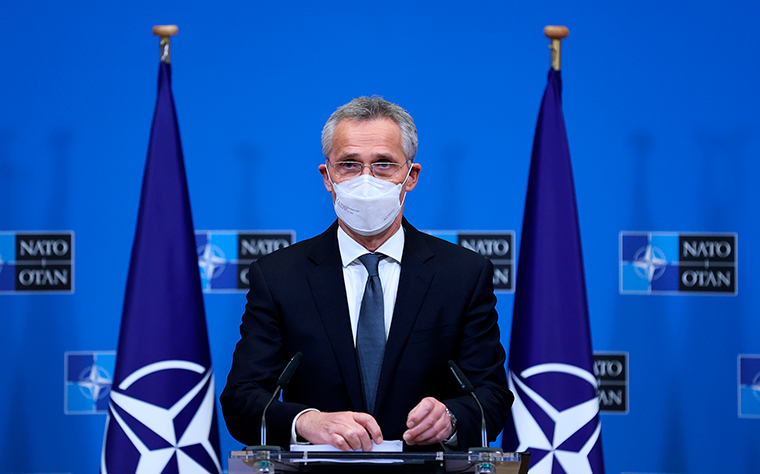
The withdrawal of troops is the beginning of "a new chapter" and “a new kind of partnership” with Afghanistan, NATO Secretary General Jens Stoltenberg said at a news conference on Wednesday.
“The only way to support the country isn’t by having thousands of combat troops deployed in the country. (…) “We have diplomatic tools, we have economic tools, we have development, we have humanitarian aid. All of that is at the disposal of NATO Allies and NATO,” Stoltenberg said.
“All Allies are aware that this is not an easy decision. And this is a decision that entails risks. And also a decision that really requires that we continue to stay focused on Afghanistan. Partly to make sure that the withdrawal takes place in a safe and secure and orderly way,” he added.
Echoing an earlier statement issued by the Alliance, Stoltenberg said: “We’re sending a very clear message to the Taliban: if they start to attack us we will retaliate and answer in a very forceful way.”
“This is not the end. This is the beginning of a new way of working with Afghanistan. But I think that after 20 years, Allies saw that the time had come to end our military presence there,” he added.
Defense secretary: US will look continue to fund "key capabilities" in Afghanistan
From CNN's Ellie Kaufman and Oren Liebermann
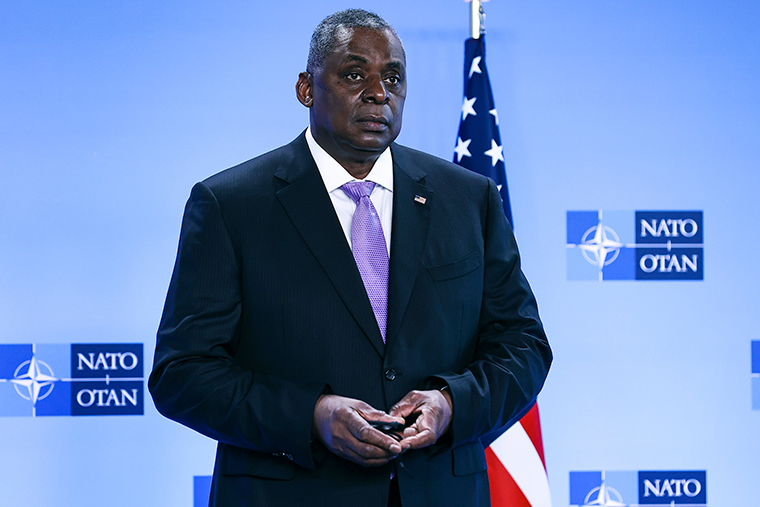
Secretary of Defense Lloyd Austin said the US will look to “continue funding key capabilities” including the Afghan Air Force and Special Mission Wing, and he said the US will continue paying salaries for Afghan Security Forces.
“We will look to continue funding key capabilities such as the Afghan air force and special mission wing, and we will seek to continue paying salaries for Afghan Security Forces
Austin said he fully supports President Biden’s decision to withdraw US troops from Afghanistan by Sept. 11 during remarks at NATO headquarters in Brussels, Belgium, on Wednesday.
"I want to thank our NATO allies and partners for the time they have afforded us to complete our review and explain our President’s decision to withdraw all US forces from Afghanistan by September 11, 2021,” Austin said. “I fully support his decision."
When asked about disagreements from the military over a withdrawal, Austin said the process was inclusive and concerns were taken into consideration.
“This was an inclusive process, and their voices were heard and their concerns taken into consideration as the President made his decision. But now that the decision has been made, I call upon them to lead their forces — to lead their forces — through this effort, through this transition, and knowing them all very well as I do, I have every confidence that they will in fact lead their force through this effort,” Austin said.
“We also will work closely with them and with our allies to maintain counterterrorism capabilities in the region sufficient to ensuring Afghanistan cannot become a safe haven for terrorists who threaten our security,” Austin said.
Austin said the US has “accomplished the mission” in Afghanistan, making “economic, civil, and political progress” in the country over the years.
“Our troops have accomplished the mission they were sent to Afghanistan to accomplish,” Austin said. “Their service and their sacrifices, alongside those of our Resolute Support and Afghan partners, made possible the greatly diminished threat to all of our homelands from Al Qaeda and other terrorist groups.”
Austin acknowledged the ongoing violence from the Taliban.
“There is still too much violence, to be sure. And we know the Taliban still seek to reverse some of this progress,” Austin said. “That is why we support wholeheartedly the diplomatic efforts ongoing to achieve a negotiated and political settlement that the Afghan people themselves endorse."
Biden visits graves of troops killed in Afghanistan at Arlington Cemetery
From CNN's Maureen Chowdhury and Jason Hoffman
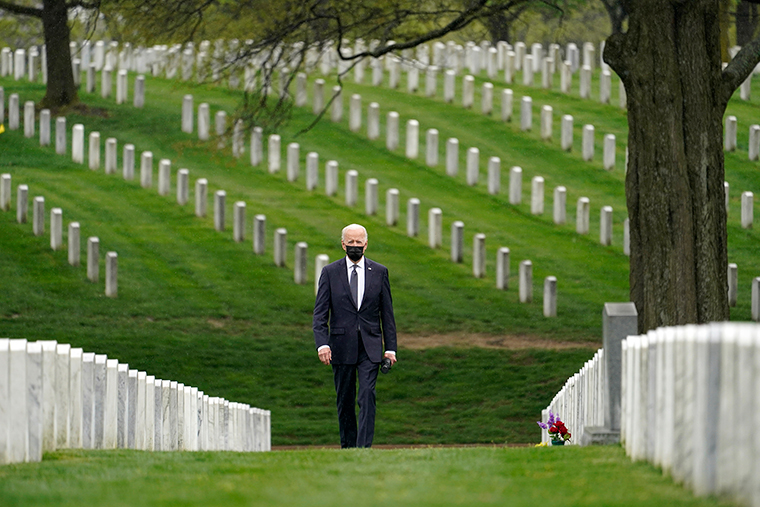
President Biden visited the graves of US troops killed in Afghanistan at Arlington Cemetery, following his announcement of withdrawing troops from the country.
"I'm always amazed at, generation after generation, women and men who are prepared to give their lives for their country. They don't give it for their country, per se, they give it for their mothers, their brothers, sisters, their fathers, their uncles, their aunts. It means I have trouble these days ever showing up at a cemetery and not thinking about my son Beau, who proudly insisted on putting on that uniform and going with his unit to Iraq and giving up his spot as attorney general in the state of Delaware, because he thought it was the right thing to do," Biden said after paying his respects.
Asked if the decision to withdraw troops from Afghanistan was a hard decision, Biden said “no it wasn’t” and to him, it was “absolutely clear.”
He said the US went to Afghanistan for two reasons, to get rid of Osama bin Laden and end the safe haven for terrorists, and the US has done that.
Watch the moment:
Here's a look at how US troop levels in Afghanistan have changed since 2001
From CNN's Christopher Hickey
President Biden formally announced his decision today to withdraw American troops from Afghanistan before Sept. 11.
When Biden took office in January, about 2,500 troops were stationed in Afghanistan, the lowest level since the beginning of the war nearly 20 years ago in 2001.
The US troop presence was at its highest throughout 2010 and 2011 after former President Barack Obama sent an additional 47,000 troops as part of his surge strategy in 2009.
Here's a look at the number of US troops in Afghanistan by president:
NATO confirms withdrawal of troops starting May 1
From CNN's Arnaud Siad
NATO says it plans to start withdrawing troops May 1, in line with what President Biden announced Wednesday afternoon.
"...recognising that there is no military solution to the challenges Afghanistan faces, Allies have determined that we will start the withdrawal of Resolute Support Mission forces by May 1. This drawdown will be orderly, coordinated, and deliberate. We plan to have the withdrawal of all US and Resolute Support Mission forces completed within a few months. Any Taliban attacks on Allied troops during this withdrawal will be met with a forceful response," the North Atlantic Council Ministerial Statement on Afghanistan said in a statement Wednesday.
Pelosi on Biden's Afghanistan decision: "I support this transition"
From CNN's Annie Grayer
House Speaker Nancy Pelosi released a statement supporting President Biden’s announcement of his timeline for withdrawing troops from Afghanistan:
"“The Biden Administration’s announced timeline for the safe, strategic and orderly departure of American troops from Afghanistan is an important and welcomed development. As Speaker, I support this transition and President Biden’s leadership to protect the safety of our troops and the security of the American people, which must be our priority," Pelosi said in the statement.
The House Speaker said Congress "remains committed to advancing peace and security in Afghanistan and the region, including an inclusive Afghan government that respects the human rights of all its people."
Please enable JavaScript for a better experience.

Visits By Foreign Leaders of Afghanistan
- Transition Guide (Opens in new window)
- Subscribe Now (Opens in new window)
Your Military
- Army Times (Opens in new window)
- Navy Times (Opens in new window)
- Air Force Times (Opens in new window)
- Marine Corps Times (Opens in new window)
- Pentagon & Congress
- Defense News (Opens in new window)
- Israel-Palestine
- Extremism & Disinformation
- Afghanistan
- Benefits Guide (Opens in new window)
- Family Life
- Military Pay Center
- Military Retirement
- Military Benefits
- Discount Depot
- Gear Scout (Opens in new window)
- Military Culture
- Military Fitness
- Military Movies & Video Games
- Military Sports
- Pay It Forward (Opens in new window)
- Military History
- Salute to Veterans
- Black Military History
- Congressional Veterans Caucus (Opens in new window)
- Military Appreciation Month
- Vietnam Vets & Rolling Thunder
- Service Members of the Year (Opens in new window)
- World War I
- Honor the Fallen (Opens in new window)
- Hall of Valor (Opens in new window)
- Create an Obituary (Opens in new window)
- Medals & Misfires
- Installation Guide (Opens in new window)
- Battle Bracket
- America's Military
- Task Force Violent
- CFC Givers Guide
- Newsletters (Opens in new window)
- Early Bird Brief
- MCON (Opens in new window)
- Long-Term Care Partners
- Navy Federal
In photos: US presidents visiting war zones
President Joe Biden made an unannounced visit to Kyiv, Ukraine, on Monday ahead of the one-year anniversary of the Russian invasion. The president’s visit marked the first time in modern history that a U.S. commander-in-chief visited an active war zone without a U.S. military presence.
During his visit, Biden met with Ukrainian President Volodymyr Zelensky and pledged another multi-million dollar military aid package to Ukraine, which will include more ammunition for U.S.-provided High Mobility Artillery Rocket Systems and howitzers, as well as Javelins, anti-armor systems and air surveillance radars.
While his particular visit was unique, given the lack of U.S. military personnel present, Biden’s journey does add him to a long list of U.S. presidents who have made an appearance in war zones.
Presidents Day: Biden holds surprise meeting with Zelensky in Kyiv
The u.s. president spent more than five hours in the ukrainian capital..
Abraham Lincoln
During the Civil War, with Confederate troops invading Washington in July 1864, Abraham Lincoln visited the nearby battlefield at Fort Stevens . It is considered one of the only times in American history where an incumbent president came under direct fire from an enemy combatant.
Franklin Roosevelt
U.S. President Franklin D. Roosevelt, left, and British Prime Minister Winston Churchill are shown at the Allied conference in Casablanca, Morocco, Jan. 1943. (AP Photo)
Amid the height of World War II, President Roosevelt left the White House for various overseas conferences and to visit Allied military installations.
Dwight D. Eisenhower
President-elect Dwight D. Eisenhower as he departs in his light plane from South Korea on Dec. 4, 1952. (AP Photo)
The president-elect visited troops who were only recently pulled out of the line after months of hard fighting.
Lyndon B. Johnson
President Lyndon B. Johnson addresses troops at Cam Ranh Bay, South Vietnam, in Oct. 1967 during the Vietnam War. (AP Photo)
President Johnson stopped by Cam Ranh Bay, South Vietnam, in 1967 after a visit to the country a year earlier.
Richard Nixon
President Richard Nixon with soldiers during his visit in South Vietnam, July 1969. (AP Photo)
Before U.S. forces withdrew from Vietnam, President Richard Nixon made his way overseas to the country for a brief visit.
Ronald Reagan
President Ronald Reagan on Nov. 13, 1983. (Scott Stewart/AP)
President Reagan observed positions in North Korea from the South Korean side of the demilitarized zone in 1983.
George H. W. Bush
President George H.W. Bush prepares to speak following his arrival in camp for a Thanksgiving Day visit during Operation Desert Shield in Saudi Arabia Nov. 25, 1990. (Spc. Daniel Jackson/Army)
After U.S. troops deployed in 1990 for Operation Desert Shield, the elder Bush made a Thanksgiving visit to military personnel in Saudi Arabia.
Bill Clinton
President Bill Clinton in South Korea plays the sax for a cheering crowd of American soldiers at Camp Casey in South Korea Sunday, July 11, 1993. (Yun Jai-Hyoung/AP)
In addition to a visit with U.S. troops in South Korea, President Bill Clinton spent time with military personnel in Bosnia in both 1996 and 1997.
George W. Bush
President George W. Bush carry a platter of turkey and fixings as he visits U.S. troops for Thanksgiving in Baghdad, Thursday, Nov 27, 2003. (Anja Niedringhaus/AP)
President George Bush, who oversaw the deployment of U.S. troops to both Afghanistan and Iraq, made numerous visits to both war zones during his two terms in office. He also made multiple trips to South Korea.
Barack Obama
President Barack Obama is applauded by military personnel during his visit to Camp Victory in Baghdad, Iraq, Tuesday, April 7, 2009. (Charles Dharapak/AP)
During his eight years in office, President Barack Obama stopped to see military personnel in Iraq as well as in Afghanistan and South Korea.
Donald Trump
President Donald Trump addressing members of the military during a surprise Thanksgiving visit, Thursday, Nov. 28, 2019, at Bagram Air Field, Afghanistan. (Alex Brandon/AP)
President Donald Trump visited troops overseas in Iraq and Afghanistan during his term. In 2019, he also made history at the demilitarized zone between North and South Korea before visiting troops at Osan Air Base.
Jonathan is a staff writer and editor of the Early Bird Brief newsletter for Military Times. Follow him on Twitter @lehrfeld_media
In Other News
A Marine combat instructor shielded his student from a grenade with his body — and survived
When then-sgt. brett meil saw a student inadvertently activate a grenade during infantry training, he covered him with his body and prepared to die..
VA to provide grants for veteran, spouse employment help
A new grant program will provide up to $500,000 to organizations helping veterans and spouses land post-military jobs..
Navy offering big bucks to keep aviation officers in uniform
Aviators from a variety of platforms are eligible for big bucks if they opt to stay navy..
Watchdog blasts VA for errors leading to $11M in improper bonuses
A watchdog report criticized va leaders for mistakes in handling $11 million in bonuses for senior department leaders..
Marine Corps’ longest-held Vietnam War POW, Harlan Chapman, dies at 89
Marine aviator harlan chapman once spent 2,657 days in captivity before his release in 1973. the retired lieutenant colonel passed away monday, may 6..
Afghanistan's president will visit Biden at the White House on Friday
U.S. Central Command said that more than 50% of the withdrawal has taken place.
As the U.S. military drawdown from Afghanistan continues, the White House announced that the Afghan president and chairman of the High Council for National Reconciliation will visit with President Joe Biden on Friday in Washington.
President Ashraf Ghani and Chairman Abdullah Abdullah's visit will "highlight the enduring partnership between the United States and Afghanistan as the military drawdown continues," White House press secretary Jen Psaki said in a statement Sunday.
MORE: Hope dims for American hostage as US hastily exits Afghanistan
While Biden set the goal to have all U.S. troops out of Afghanistan by Sept. 11, a U.S. official told ABC News that the reality is the troop withdrawal from Afghanistan could be completed as early as July.
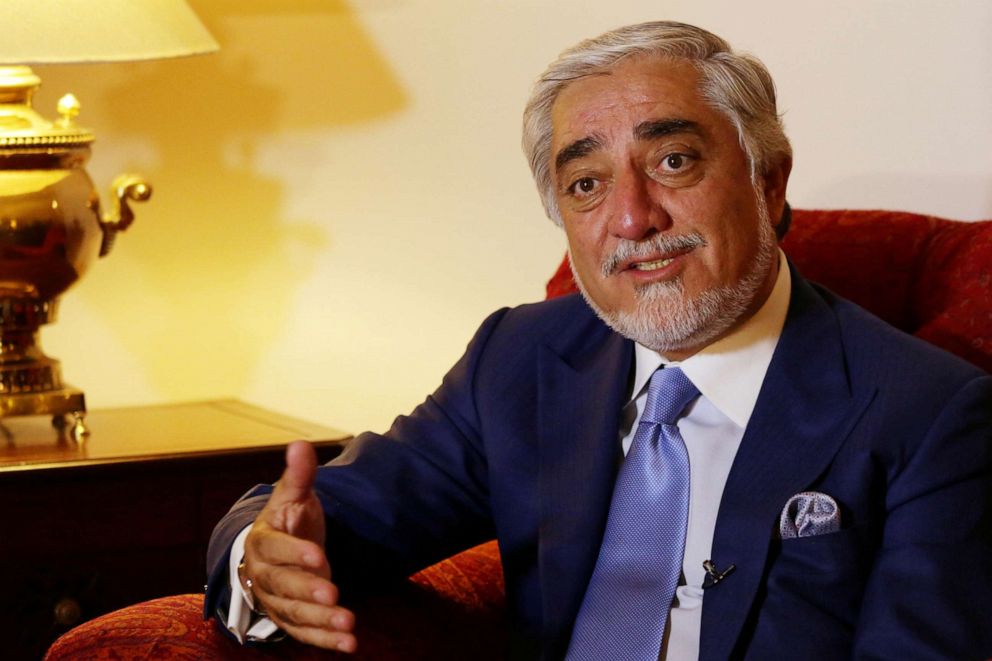
The latest release from U.S. Central Command this past week showed that more than 50% of the withdrawal has taken place already.
MORE: US embassy in Afghanistan on strict lockdown amid 'surging COVID cases, full ICU
Despite the speed of the withdrawal, the White House highlighted its commitment to continuing to support Afghanistan.
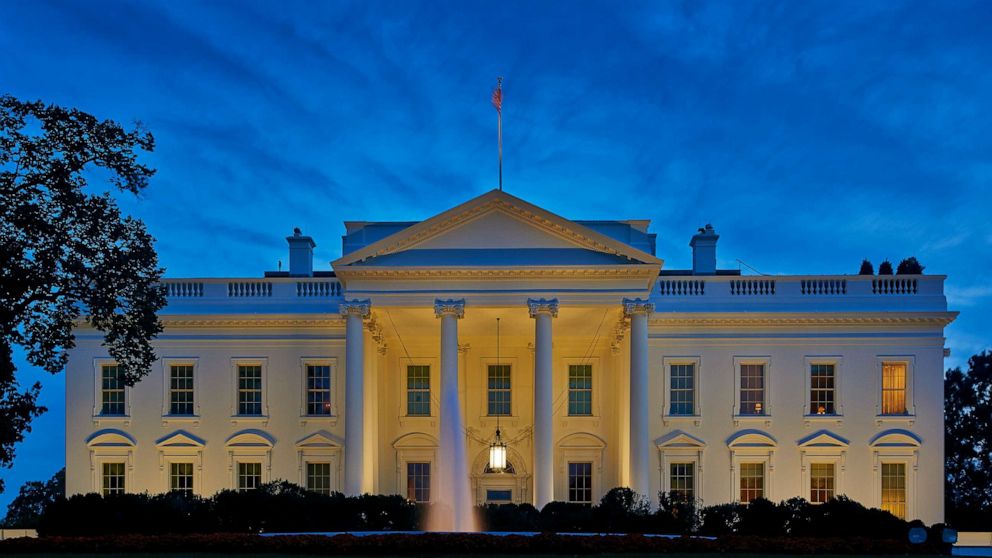
"The United States is committed to supporting the Afghan people by providing diplomatic, economic, and humanitarian assistance to support the Afghan people, including Afghan women, girls and minorities," according to the White House statement.
MORE: US exit from Afghanistan leaves progress, anxiety in its wake: Reporter's Notebook
However, the accelerated exit is raising concerns for the family of civil engineer Mark Frerichs, a U.S. Navy veteran who has been held hostage by the Taliban since January 2020, and for those who worked on behalf of the Pentagon in Afghanistan and were promised a special immigrant visa from the U.S. The special visa program has long faced delays, leaving many feeling abandoned amid growing threats from the Taliban.
Secretary of State Antony Blinken said during an unannounced visit to Kabul in April that he is "committed" to the SIV program, but he has not committed to any reforms to make the process quicker or address the enormous backlog.
"The decisions to withdraw and leave those who served and helped the U.S. government will be judged in bad words, and no one will trust in USA in the future. It's going to be a catastrophe and mass killing tragedy by the Taliban, who believe those who worked with USA are no longer Muslim," said "Abdul," an Afghan contractor who has long waited for a U.S. visa and whose real name ABC News agreed not to use for his safety.
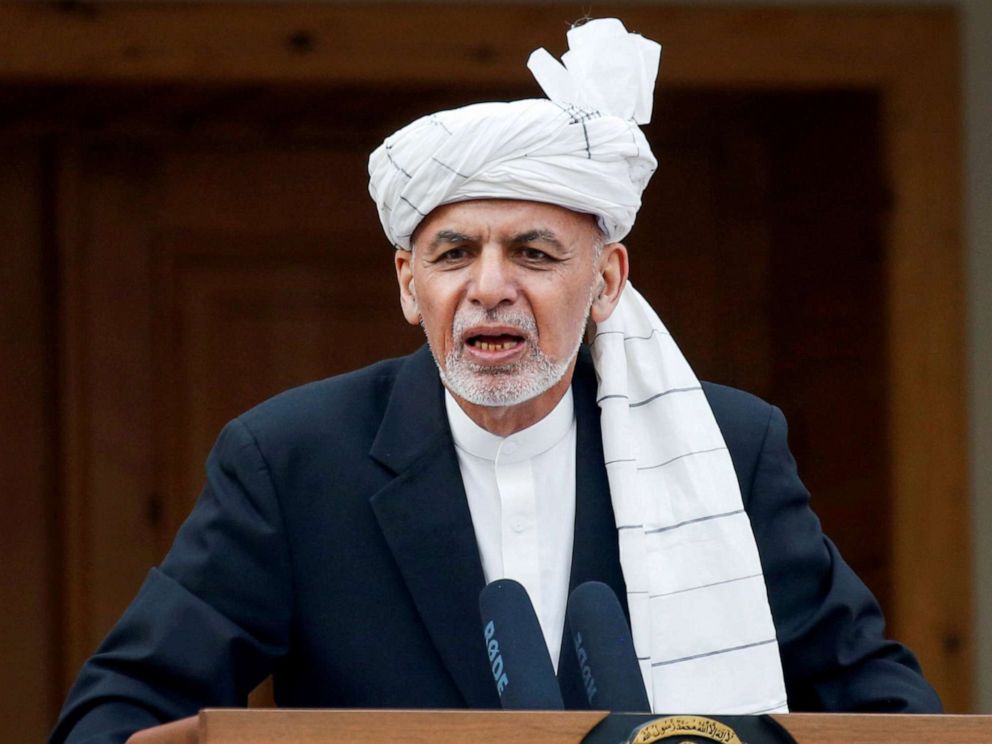
After being granted conditional approval, he was told in December that his application was rejected because the U.S. embassy could not verify his employment. But his American employer was Frerichs, who had been kidnapped.
"We understand that the Taliban wants one of their guys released from U.S. custody in exchange for Mark. This guy has been in prison for 16 years and the war is coming to an end. We think people on both sides should be able to go home when it ends," Frerichs' sister Charlene told ABC News.
Psaki, in the White House statement on Sunday, went on to say, "The United States will remain deeply engaged with the Government of Afghanistan to ensure the country never again becomes a safe haven for terrorist groups who pose a threat to the U.S. homeland. The United States continues to fully support the ongoing peace process and encourages all Afghan parties to participate meaningfully in negotiations to bring an end to the conflict."
ABC News' Luis Martinez, Matt Seyler, Conor Finnegan and James Gordon Meek contributed to this report.
Related Topics
- Afghanistan
Top Stories

Exclusive: Mom speaks out after Air Force rescued son from cruise ship
- May 9, 7:36 AM

Trump trial live updates: Michael Cohen expected to testify Monday, sources say
- 3 minutes ago

What led to DNA match, arrest of minister two decades after murders of 2 teens
- May 10, 6:03 AM

6 big takeaways from Day 14 of Trump's hush money trial
- May 9, 6:14 PM

Steve Bannon's contempt of Congress conviction upheld by appeals court
- 21 minutes ago

ABC News Live
24/7 coverage of breaking news and live events
- Cover Letters
- Jobs I've Applied To
- Saved Searches
- Subscriptions
- Marine Corps
- Coast Guard
- Space Force
- Military Podcasts
- Benefits Home
- Military Pay and Money
- Veteran Health Care
- VA eBenefits
- Veteran Job Search
- Military Skills Translator
- Upload Your Resume
- Veteran Employment Project
- Vet Friendly Employers
- Career Advice
- Military Life Home
- Military Trivia Game
- Veterans Day
- Spouse & Family
- Military History
- Discounts Home
- Featured Discounts
- Veterans Day Restaurant Discounts
- Electronics
- Join the Military Home
- Contact a Recruiter
- Military Fitness
27 Times the Commander-in-Chief Visited a Combat Zone
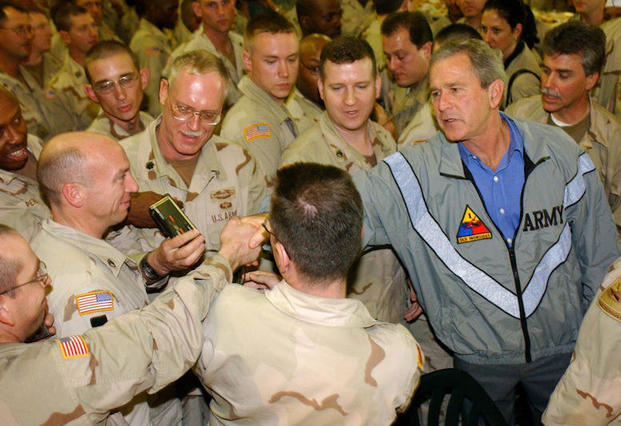
BY BLAKE STILWELL - WEARETHEMIGHTY.COM
Generally, American presidents feel an obligation to see situations firsthand when they commit troops to war. To wit, here are 27 times commanders-in-chief left the White House and headed for combat zones:
1. FDR visits Casablanca as Allied forces assault Tripoli, January 1943

Franklin D. Roosevelt at the Casablanca Conference
2. FDR visits the Mediterranean island of Malta to confer with Winston Churchill, February 1945

3. Roosevelt meets Stalin and Churchill at Yalta, February 1945

4. Ike goes to Korea, December 1952

5. LBJ stops in Cam Ranh Bay, South Vietnam, 1966

(LBJ Library)
6. LBJ returns to Cam Ranh Bay, South Vietnam, 1967

7. Nixon visits in Saigon, South Vietnam, July 1969

(Nixon Library Photo)
8. Reagan stops at the Korean DMZ for lunch, November 1983

President Reagan in the food line during his trip to the Republic of Korea and a visit to the DMZ Camp Liberty Bell and lunch with the troops (Reagan Library photo)
9. Bush 41 drops in for Thanksgiving with U.S. troops during Desert Shield, 1990

(Bush Library)
10. Clinton with U.S. troops at Camp Casey, South Korea, 1993

(DoD photo)
11. Clinton visits U.S. troops in Bosnia, January 1996

Bill Clinton visiting U.S. troops at Tuzla Air Base in Bosnia and Herzegovina, 1996. (DoD photo)
12. Clinton returns to Bosnia in December 1997 to visit NATO and U.S. troops

President Bill Clinton shakes hands with soldiers at the Tuzla Air Field, Bosnia and Herzegovina, on Dec. 22, 1997. The president was accompanied by his wife Hillary, their daughter Chelsea, former Senator Bob Dole and his wife Elizabeth, for the holiday visit with the troops. (DoD photo by Spc. Richard L. Branham, U.S. Army)
13. Bush 43 grabs chow with the troops in South Korea, 2002

(White House Photo)
14. Bush 43 surprises troops in Iraq, November 2003

President George W. Bush pays a surprise visit to Baghdad International Airport (BIAP). He gives an uplifting speech at the Bob Hope dining facility on Thanksgiving Day to all the troops stationed there. (U.S. Air Force photo by Staff Sgt. Reynaldo Ramon)
15. Bush 43 returns to South Korea, Osan Air Base, 2005

16. Bush 43 visits Bagram Air Base, Afghanistan, March 2006

President George Bush shakes hands with Sgt. Derek Kessler, 10th Mountain Division Headquarters Company driver. (U.S. Army photo)
17. Bush 43 visits troops in Baghdad, June 2006

(White House photo)
18. Bush 43 visits Al-Anbar province, Iraq, September 2007

President Bush: Visit Regimental Combat Team-2, Marine Wing Support Combat Patrol. Al Asad Airbase, Al Anbar Province, Iraq (U.S. Marine Corps photo)
19. Bush 43 returns to South Korea, August 2008

20. Bush 43 makes one last stop in Iraq, December 2008

21. Obama stops in Iraq to see the troops, April 2009

22. Obama stops into Osan Air Base, South Korea, November 2009

23. Obama makes his first stop at Bagram Air Base, December 2010

(U.S. Army photo)
24. Obama visits the DMZ, South Korea, March 2012

25. Obama makes his second trip to Afghanistan, May 2012

President Barack Obama greets U.S. troops at Bagram Air Field after a surprise visit to Afghanistan, May 1, 2012. (Official White House Photo by Pete Souza)
26. Obama visits Yongsan Garrison, South Korea 2014

27. Obama makes what could be his last trip to Afghanistan, May 2014

MORE POSTS FROM WE ARE THE MIGHTY:
The 4 US Presidents with the craziest war stories
8 Presidents who actually saw combat in a big way
These photos show what our veteran presidents looked like in uniform
We Are The Mighty (WATM) celebrates service with stories that inspire. WATM is made in Hollywood by veterans. It's military life presented like never before. Check it out at We Are the Mighty .
You May Also Like
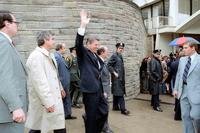
Jerry Parr was just 9 years old when his father took him to see "Code of the Secret Service," the 1939 action drama starring...

Here are some games for any budget, whether you're enjoying a healthy tax return or struggling with a predatory loan on your...

Paramount+ may not have all our old favorites when it comes to war movies and television shows, but there's no shortage of...

If you're looking for the best war movies on Amazon's Prime Video service, our list can help you cut through the chaff and...
- Entertainment
- Military Equipment
- Outdoor Guide
Select Service
My membership.
- National Guard
Mobile Menu Overlay
The White House 1600 Pennsylvania Ave NW Washington, DC 20500
Statement by President Joe Biden on Afghanistan
Over the past several days, I have been in close contact with my national security team to give them direction on how to protect our interests and values as we end our military mission in Afghanistan.
First, based on the recommendations of our diplomatic, military, and intelligence teams, I have authorized the deployment of approximately 5,000 U.S. troops to make sure we can have an orderly and safe drawdown of U.S. personnel and other allied personnel, and an orderly and safe evacuation of Afghans who helped our troops during our mission and those at special risk from the Taliban advance.
Second, I have ordered our Armed Forces and our Intelligence Community to ensure that we will maintain the capability and the vigilance to address future terrorist threats from Afghanistan.
Third, I have directed the Secretary of State to support President Ghani and other Afghan leaders as they seek to prevent further bloodshed and pursue a political settlement. Secretary Blinken will also engage with key regional stakeholders.
Fourth, we have conveyed to the Taliban representatives in Doha, via our Combatant Commander, that any action on their part on the ground in Afghanistan, that puts U.S. personnel or our mission at risk there, will be met with a swift and strong U.S. military response.
Fifth, I have placed Ambassador Tracey Jacobson in charge of a whole-of-government effort to process, transport, and relocate Afghan Special Immigrant Visa applicants and other Afghan allies. Our hearts go out to the brave Afghan men and women who are now at risk. We are working to evacuate thousands of those who helped our cause and their families.
That is what we are going to do. Now let me be clear about how we got here.
America went to Afghanistan 20 years ago to defeat the forces that attacked this country on September 11th. That mission resulted in the death of Osama bin Laden over a decade ago and the degradation of al Qaeda. And yet, 10 years later, when I became President, a small number of U.S. troops still remained on the ground, in harm’s way, with a looming deadline to withdraw them or go back to open combat.
Over our country’s 20 years at war in Afghanistan, America has sent its finest young men and women, invested nearly $1 trillion dollars, trained over 300,000 Afghan soldiers and police, equipped them with state-of-the-art military equipment, and maintained their air force as part of the longest war in U.S. history. One more year, or five more years, of U.S. military presence would not have made a difference if the Afghan military cannot or will not hold its own country. And an endless American presence in the middle of another country’s civil conflict was not acceptable to me.
When I came to office, I inherited a deal cut by my predecessor—which he invited the Taliban to discuss at Camp David on the eve of 9/11 of 2019—that left the Taliban in the strongest position militarily since 2001 and imposed a May 1, 2021 deadline on U.S. Forces. Shortly before he left office, he also drew U.S. Forces down to a bare minimum of 2,500. Therefore, when I became President, I faced a choice—follow through on the deal, with a brief extension to get our Forces and our allies’ Forces out safely, or ramp up our presence and send more American troops to fight once again in another country’s civil conflict. I was the fourth President to preside over an American troop presence in Afghanistan—two Republicans, two Democrats. I would not, and will not, pass this war onto a fifth.
Stay Connected
We'll be in touch with the latest information on how President Biden and his administration are working for the American people, as well as ways you can get involved and help our country build back better.
Opt in to send and receive text messages from President Biden.
- South Sound News
- North Sound News
- 7-Day Forecast
- Hour by Hour
- School Closings
- Pet Walk Forecast
- Weather 24/7 Stream
- Live Stream
- KIRO 24/7 News
- Weather 24/7
- KIRO 7 Live Studio (Opens in new window)
- The $pend $mart Stream
- Law & Crime
- Curiosity NOW
- KIRO 7 Investigates
- Seattle Seahawks
- Seattle Mariners
- Seattle Kraken
- Seattle Sounders
- Seattle Storm
- College Sports
- High School Football
- On Home Ice
- KIRO 7 Live Studio
- Discover Northwest
- Healthier Together
- Woodland Park Zoo (Opens in new window)
- Your Voices
- KIRO 7 CARES
- Washington Grown
- Back to School
- Seattle Pride 2023
- Share Your Pics!
- Steals and Deals
- Jesse Jones
- KIRO 7 Apps
- Newsletter Sign-ups (Opens in new window)
- KIRO 7 News Team
- Submit a news tip
- KIRO 7 TV Schedule
- Advertise With Us
- Closed Captioning
- KIRO 7 FCC EEO Report (Opens in new window)
- KIRO 7 Public File (Opens in new window)
- Visitor Agreement
- Privacy Policy
- Telemundo Seattle (Opens in new window)
- Jobs at KIRO 7 (Opens in new window)
- Disneyland Flyaway
The Taliban warn journalists and experts against cooperating with Afghanistan International TV
Afghanistan This is a locator map for Afghanistan with its capital, Kabul. (AP Photo) (Uncredited/AP)
KABUL, Afghanistan — (AP) — The Taliban on Thursday warned journalists and experts against working with Afghanistan International TV, saying they would be committing a crime if they cooperated with the station. It's the first time they have told people not to cooperate with a specific outlet.
Afghanistan International TV, which is headquartered in London, is accessible through satellite, cable and social media.
A spokesman for the Taliban-controlled Ministry of Information and Culture alleged the station was committing professional violations and violating moral and legal boundaries.
The Media Violations Commission wanted all journalists and experts in Afghanistan to cease their collaboration with the station, said ministry spokesman Habib Ghofran.
“At the commission’s meeting held yesterday (Wednesday), it was decided that participating in discussions and facilitating the broadcast of this media outlet in public places is prohibited,” added Ghofran.
The deputy minister for broadcasting Zia ul Haq Haqmal said people would be committing a crime if they cooperated with the station.
He cited 10 reasons to avoid working with Afghanistan International TV, including its alleged distortion or falsification of information and campaigning against the ruling system.
“If someone does not cooperate on the basis of all these 10 reasons, then it’s the court’s job to give a punishment,” said Haqmal.
The director of Afghanistan International TV, Harun Najafizada, said the commission's decision would not affect the channel because it had no employees or freelancers in the country.
“We don’t have anyone on the ground and rely on the reporting of Afghan citizens,” said Najafizada. “That’s more challenging, but we have tough verification. It’s a threat to free media, to other media, and to put pressure on us to forgo our professional standards. It’s not going to work.”
Afghanistan fares abysmally in terms of press freedom . The latest index from Reporters without Borders ranked the country 178 out of 180. It ranked 152 last year.
The organization said three radio reporters were arrested in April for broadcasting music and receiving calls from female listeners during shows. Local authorities weren’t available to confirm the arrests.
Also last month, the Taliban suspended two TV stations for failing to "consider national and Islamic values."
The director for one of the suspended stations, Barya TV, rejected the Taliban’s allegations. The station is still off air.
Latif Sadiq said the station wasn’t informed about the suspension. “The reports that they repeatedly warned (Barya) are absolute lies,” Sadiq said Thursday. “They have decided on their own that (Barya) television is off, broadcasting is off, and they said the case will go to court.”
Many journalists lost their jobs after the Taliban takeover in 2021, with media outlets closing over a lack of funds or because their staff left the country. Women journalists face additional hardships because of work bans and travel restrictions.
During their previous rule in the late 1990s, the Taliban barred most television, radio and newspapers.
Copyright 2024 The Associated Press. All rights reserved. This material may not be published, broadcast, rewritten or redistributed without permission.

President Biden’s visit to Seattle expected to cause traffic troubles, delay flights
:quality(70)/cloudfront-us-east-1.images.arcpublishing.com/cmg/I5PENNAEL5CV3GYHIXJ7UR4YJE.jpg)
Boeing 737-900 flight to Seattle makes emergency landing after engine failure
:quality(70)/cloudfront-us-east-1.images.arcpublishing.com/cmg/ZN7UEOBNIDZPWFGEYKQYWOY6JU.jpg)
Three new incidents involving Boeing planes in just two days
:quality(70)/cloudfront-us-east-1.images.arcpublishing.com/cmg/2A3HQYHENBFUTNSDXF4J7R3TDI.png)
New report names best elementary schools in Washington State
:quality(70)/cloudfront-us-east-1.images.arcpublishing.com/cmg/P5AWQ6U52VFLHLHTVPQEITXH2U.jpg)
Seattle father who allegedly killed his sleeping 9-month-old son blames demons
- Skip to main content
- Keyboard shortcuts for audio player
Morning Edition
- Latest Show
- About The Program
- Contact The Program
- Corrections
Listen to the featured story from this episode.

Álvaro Enciso places crosses at sites where migrants are known to have died in the borderland, this cross represents the death of Nolberto Torres-Zayas just east of Arivaca, Arizona on Wednesday, March 27, 2024. Torres-Zayas died of hyperthermia in 2009, not far from a Humane Borders water cache that had been vandalized and drained. Ash Ponders for NPR hide caption
We, The Voters
Is it easy for migrants to enter the u.s. we went to the border to find out.
Morning Edition spoke to migrants hoping to enter the U.S. and the border agents tasked with keeping them out.
Middle East
Morning news brief.
by Michel Martin , Steve Inskeep
Author Interviews
'washington post' columnist david ignatius releases 12th novel: 'phantom orbit'.

Ammer Qudummi was arrested at a UT Austin protest on April 26, but all charges have been dropped. Michael Minasi/KUT hide caption
Campus protests over the Gaza war
How these university of texas-austin students view gaza war protests on their campus.
by Mansee Khurana
Why more than 1,000 sea lions are lounging at Pier 39 in San Francisco

Republican Sen. Bill Hagerty of Tennessee speaks about the Senate version of the Equal Representation Act during a January press conference in Washington, D.C. The bill is one of at least a dozen GOP proposals to exclude some or all non-U.S. citizens from a special census count that the 14th Amendment says must include the "whole number of persons in each state." Mariam Zuhaib/AP hide caption
Republicans in Congress are trying to reshape election maps by excluding noncitizens
by Hansi Lo Wang

Miguel Divo shows his patient, Joel Rubinstein, a dry powder inhaler. It's an alternative to some puff inhalers that emit potent greenhouse gases, but is equally effective for many patients with asthma. Jesse Costa/WBUR hide caption
Shots - Health News
Could better asthma inhalers help patients, and the planet too.
by Martha Bebinger
Internet connectivity — even in 2024 — is vulnerable at a number of levels
by Jenna McLaughlin

by Steve Inskeep , Ally Schweitzer
After some setbacks, Boeing prepares for Starliner's first crewed launch into space
by Steve Inskeep , Brendan Bryrne
Week 4 of the Trump hush money case is about to get underway
by Michel Martin , Ximena Bustillo
China's President Xi Jinping begins a 5-day tour in Europe
by Steve Inskeep , Eleanor Beardsley
Woman denies being an 'outside agitator' in Columbia University protests
Madonna just gave the biggest live performance of her career, lou reed issued one of the most puzzling albums in rock history in 1975.
by Phil Harrell
GOP effort started by Rep. Marjorie Taylor Green will try to oust Speaker Johnson
Cease-fire negotiations between israel and hamas appear to have broken down.
by Steve Inskeep , Lauren Frayer

Women no longer have to make the first move on Bumble, the dating app that was launched in 2014 with the goal of putting more power in the hands of women. Nikos Pekiaridis/Getty Images hide caption
Women no longer have to make the first move on Bumble. Will it make the app better?
by Claire Murashima
Searching for a song you heard between stories? We've retired music buttons on these pages. Learn more here.
Taliban's quest for tourists to see the wonders of Afghanistan
Troubled country wants to become a 'tourism powerhouse' – but how safe is it?
- Newsletter sign up Newsletter
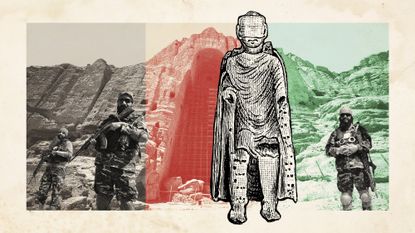
Holidaying in a country torn apart by warfare and ruled by fundamentalists won't be top of everyone's bucket list but the number of foreign tourists visiting Afghanistan rose 120% in 2023, reaching nearly 5,200.
Travel officials want Afghanistan to become a "tourism powerhouse", said AP , an ambition backed by the Taliban's top leaders, who assured The Times that "attention has been paid to peace and order in the areas where tourists go."
But why are visitors returning to Afghanistan and how safe is it?
Subscribe to The Week
Escape your echo chamber. Get the facts behind the news, plus analysis from multiple perspectives.

Sign up for The Week's Free Newsletters
From our morning news briefing to a weekly Good News Newsletter, get the best of The Week delivered directly to your inbox.
'Bragging rights'
During the 1960s and 1970s, Afghanistan was part of the overland "hippy trail" route across Asia, with "hundreds of thousands of Western tourists" passing through, said Sky News , although as its "complicated modern history unfolded", the "steady stream of travellers stopped". But now, foreigners are visiting the country again, encouraged by the "sharp drop in violence", increased flight connections with hubs like Dubai, and the "bragging rights that come with vacationing in an unusual destination", said AP. Although the numbers aren't huge, they "never were" and there's still "a buzz around Afghan tourism".
The visitor revival is thanks to efforts by the nation's tourist officials, who are working hard to overcome numerous obstacles. There are problems with the road network, which is "half-paved or non-existent in some parts of the country", said the outlet, and the fact that airlines "largely avoid Afghan airspace".
"Decades of conflict" have made tourists in Afghanistan "extremely rare" in recent times, said Al Jazeera , and although most violence has now abated, visitors are "still confronted with extreme poverty, dilapidated cultural sites" and "scant hospitality infrastructure".
Tourists who visit will "holiday under the austere control of the Taliban authorities", without consular support, and they must also comply with a strict dress code and submit to searches at checkpoints.
The Taliban has an infamous track record of oppressing women and has even banned women from a national park, ruling that "going sightseeing is not a must for women". Untamed Borders, which runs mixed-gender tours to Afghanistan, told Sky News that although women travellers can "spend time with women in homes", there "are other things that women are not allowed to do and certain places they're not allowed to visit".
Stefanie Meier, a 53-year-old US citizen who spent a month travelling from Kabul to Kandahar via Bamiyan and Herat in the west, told Al Jazeera she did not face any issues as a woman on her own.
The country's only five-star hotel, the Serena, has reopened its women's spa and salon for foreign females after a closure of several months, but foreigners must show their passport to access services and women with "born in Afghanistan" on their ID are barred.
The biggest foreign-visitor market is China, thanks to its proximity and large population. Afghanistan and neighbouring Pakistan are both "attempting to convince Beijing" that their countries are "safe enough and stable enough to be part of, or remain part of, its global infrastructure embrace", said The Times.
'Unique experiences'
Although the UK Foreign Office currently advises against all travel to Afghanistan, highlighting its "volatile" security situation and an "ongoing and high threat of terrorist attacks", some "adventurous tourists aren't letting this stop them", said Sky News.
There are hoops to jump through. Just a "handful" of embassies around the world are able to issue visas and at all but one, you must apply in person, said Sky News. You will need specialist insurance, as regular providers do not cover travel to countries on the Foreign Office's red list.
"Unique sights, history and cultural experiences await" those willing to take the risk, said the broadcaster. Tourists can visit Bamiyan, an ancient route between India and China, the famous minaret of Jam, the cities of Herat, Kabul and Mazar-e-Sharif, and the site where two gigantic sixth-century Buddhas stood until the Taliban destroyed them in 2001.
Sign up for Today's Best Articles in your inbox
A free daily email with the biggest news stories of the day – and the best features from TheWeek.com
Chas Newkey-Burden has been part of The Week Digital team for more than a decade and a journalist for 25 years, starting out on the irreverent football weekly 90 Minutes, before moving to lifestyle magazines Loaded and Attitude. He was a columnist for The Big Issue and landed a world exclusive with David Beckham that became the weekly magazine’s bestselling issue. He now writes regularly for The Guardian, The Telegraph, The Independent, Metro, FourFourTwo and the i new site. He is also the author of a number of non-fiction books.

Puzzles and Quizzes Issue - May 17, 2024
By The Week Staff Published 9 May 24

Puzzles and Quizzes
By The Week US Published 9 May 24
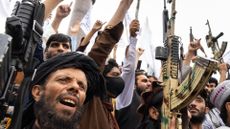
feature Economic collapse, a crackdown on women’s rights and an exodus of the professional class leaves country in crisis
By The Week Staff Published 16 August 22

By Catherine Garcia Published 14 September 21

By Peter Weber Published 23 August 21

The Week Recommends War porn or critique of the American military machine? Film about Navy Seals in Afghanistan triggers debate
By The Week Staff Published 31 January 14
- Contact Future's experts
- Terms and Conditions
- Privacy Policy
- Cookie Policy
- Advertise With Us
The Week is part of Future plc, an international media group and leading digital publisher. Visit our corporate site . © Future US, Inc. Full 7th Floor, 130 West 42nd Street, New York, NY 10036.
- Share full article
For more audio journalism and storytelling, download New York Times Audio , a new iOS app available for news subscribers.
A Plan to Remake the Middle East
While talks for a cease-fire between israel and hamas continue, another set of negotiations is happening behind the scenes..
This transcript was created using speech recognition software. While it has been reviewed by human transcribers, it may contain errors. Please review the episode audio before quoting from this transcript and email [email protected] with any questions.
From New York Times, I’m Michael Barbaro. This is The Daily.
[MUSIC CONTINUES]
Today, if and when Israel and Hamas reach a deal for a ceasefire fire, the United States will immediately turn to a different set of negotiations over a grand diplomatic bargain that it believes could rebuild Gaza and remake the Middle East. My colleague Michael Crowley has been reporting on that plan and explains why those involved in it believe they have so little time left to get it done.
It’s Wednesday, May 8.
Michael, I want to start with what feels like a pretty dizzying set of developments in this conflict over the past few days. Just walk us through them?
Well, over the weekend, there was an intense round of negotiations in an effort, backed by the United States, to reach a ceasefire in the Gaza war.
The latest ceasefire proposal would reportedly see as many as 33 Israeli hostages released in exchange for potentially hundreds of Palestinian prisoners.
US officials were very eager to get this deal.
Pressure for a ceasefire has been building ahead of a threatened Israeli assault on Rafah.
Because Israel has been threatening a military offensive in the Southern Palestinian city of Rafah, where a huge number of people are crowded.
Fleeing the violence to the North. And now they’re packed into Rafah. Exposed and vulnerable, they need to be protected.
And the US says it would be a humanitarian catastrophe on top of the emergency that’s already underway.
Breaking news this hour — very important breaking news. An official Hamas source has told The BBC that it does accept a proposal for a ceasefire deal in Gaza.
And for a few hours on Monday, it looked like there might have been a major breakthrough when Hamas put out a statement saying that it had accepted a negotiating proposal.
Israeli Prime Minister Benjamin Netanyahu says the ceasefire proposal does not meet his country’s requirements. But Netanyahu says he will send a delegation of mediators to continue those talks. Now, the terms —
But those hopes were dashed pretty quickly when the Israelis took a look at what Hamas was saying and said that it was not a proposal that they had agreed to. It had been modified.
And overnight —
Israeli troops stormed into Rafah. Video showing tanks crashing over a sign at the entrance of the city.
— the Israelis launched a partial invasion of Rafah.
It says Hamas used the area to launch a deadly attack on Israeli troops over the weekend.
And they have now secured a border crossing at the Southern end of Gaza and are conducting targeted strikes. This is not yet the full scale invasion that President Biden has adamantly warned Israel against undertaking, but it is an escalation by Israel.
So while all that drama might suggest that these talks are in big trouble, these talks are very much still alive and ongoing and there is still a possibility of a ceasefire deal.
And the reason that’s so important is not just to stop the fighting in Gaza and relieve the suffering there, but a ceasefire also opens the door to a grand diplomatic bargain, one that involves Israel and its Arab neighbors and the Palestinians, and would have very far-reaching implications.
And what is that grand bargain. Describe what you’re talking about?
Well, it’s incredibly ambitious. It would reshape Israel’s relationship with its Arab neighbors, principally Saudi Arabia. But it’s important to understand that this is a vision that has actually been around since well before October 7. This was a diplomatic project that President Biden had been investing in and negotiating actually in a very real and tangible way long before the Hamas attacks and the Gaza war.
And President Biden was looking to build on something that President Trump had done, which was a series of agreements that the Trump administration struck in which Israel and some of its Arab neighbors agreed to have normal diplomatic relations for the first time.
Right, they’re called the Abraham Accords.
That’s right. And, you know, Biden doesn’t like a lot of things, most things that Trump did. But he actually likes this, because the idea is that they contribute to stability and economic integration in the Middle East, the US likes Israel having friends and likes having a tight-knit alliance against Iran.
President Biden agrees with the Saudis and with the Israelis, that Iran is really the top threat to everybody here. So, how can you build on this? How can you expand it? Well, the next and biggest step would be normalizing relations between Israel and Saudi Arabia.
And the Saudis have made clear that they want to do this and that they’re ready to do this. They weren’t ready to do it in the Trump years. But Mohammed bin Salman, the Crown Prince of Saudi Arabia, has made clear he wants to do it now.
So this kind of triangular deal began to take shape before October 7, in which the US, Israel, and Saudi Arabia would enter this three way agreement in which everyone would get something that they wanted.
And just walk through what each side gets in this pre-October 7th version of these negotiations?
So for Israel, you get normalized ties with its most important Arab neighbor and really the country that sets the tone for the whole Muslim world, which is Saudi Arabia of course. It makes Israel feel safer and more secure. Again, it helps to build this alliance against Iran, which Israel considers its greatest threat, and it comes with benefits like economic ties and travel and tourism. And Prime Minister Benjamin Netanyahu has been very open, at least before October 7th, that this was his highest diplomatic and foreign policy priority.
For the Saudis, the rationale is similar when it comes to Israel. They think that it will bring stability. They like having a more explicitly close ally against Iran. There are economic and cultural benefits. Saudi Arabia is opening itself up in general, encouraging more tourism.
But I think that what’s most important to the Crown Prince, Mohammed bin Salman, is what he can get from the United States. And what he has been asking for are a couple of essential things. One is a security agreement whose details have always been a little bit vague, but I think essentially come down to reliable arms supplies from the United States that are not going to be cut off or paused on a whim, as he felt happened when President Biden stopped arms deliveries in 2021 because of how Saudi was conducting its war in Yemen. The Saudis were furious about that.
Saudi Arabia also wants to start a domestic nuclear power program. They are planning for a very long-term future, possibly a post-oil future. And they need help getting a nuclear program off the ground.
And they want that from the US?
And they want that from the US.
Now, those are big asks from the us. But from the perspective of President Biden, there are some really enticing things about this possible agreement. One is that it will hopefully produce more stability in the region. Again, the US likes having a tight-knit alliance against Iran.
The US also wants to have a strong relationship with Saudi Arabia. You know, despite the anger at Mohammed bin Salman over the murder of the Saudi dissident Jamal Khashoggi, the Biden administration recognizes that given the Saudis control over global oil production and their strategic importance in the Middle East, they need to have a good relationship with them. And the administration has been worried about the influence of China in the region and with the Saudis in particular.
So this is an opportunity for the US to draw the Saudis closer. Whatever our moral qualms might be about bin Salman and the Saudi government, this is an opportunity to bring the Saudis closer, which is something the Biden administration sees as a strategic benefit.
All three of these countries — big, disparate countries that normally don’t see eye-to-eye, this was a win-win-win on a military, economic, and strategic front.
That’s right. But there was one important actor in the region that did not see itself as winning, and that was the Palestinians.
[MUSIC PLAYING]
First, it’s important to understand that the Palestinians have always expected that the Arab countries in the Middle East would insist that Israel recognize a Palestinian state before those countries were willing to essentially make total peace and have normal relations with Israel.
So when the Abraham Accords happened in the Trump administration, the Palestinians felt like they’d been thrown under the bus because the Abraham Accords gave them virtually nothing. But the Palestinians did still hold out hope that Saudi Arabia would be their savior. And for years, Saudi Arabia has said that Israel must give the Palestinians a state if there’s going to be a normal relationship between Israel and Saudi Arabia.
Now the Palestinians see the Saudis in discussions with the US and Israel about a normalization agreement, and there appears to be very little on offer for the Palestinians. And they are feeling like they’re going to be left out in the cold here.
Right. And in the minds of the Palestinians, having already been essentially sold out by all their other Arab neighbors, the prospect that Saudi Arabia, of all countries, the most important Muslim Arab country in the region, would sell them out, had to be extremely painful.
It was a nightmare scenario for them. And in the minds of many analysts and US officials, this was a factor, one of many, in Hamas’s decision to stage the October 7th attacks.
Hamas, like other Palestinian leaders, was seeing the prospect that the Middle East was moving on and essentially, in their view, giving up on the Palestinian cause, and that Israel would be able to have friendly, normal relations with Arab countries around the region, and that it could continue with hardline policies toward the Palestinians and a refusal, as Prime Minister Benjamin Netanyahu has said publicly, to accept a Palestinian state.
Right. So Michael, once Hamas carries out the October 7th attacks in an effort to destroy a status quo that it thinks is leaving them less and less relevant, more and more hopeless, including potentially this prospect that Saudi Arabia is going to normalize relations with Israel, what happens to these pre-October 7th negotiations between the US, Saudi Arabia, and Israel?
Well, I think there was a snap assumption that these talks were dead and buried. That they couldn’t possibly survive a cataclysm like this.
But then something surprising happened. It became clear that all the parties were still determined to pull-off the normalization.
And most surprisingly of all, perhaps, was the continued eagerness of Saudi Arabia, which publicly was professing outrage over the Israeli response to the Hamas attacks, but privately was still very much engaged in these conversations and trying to move them forward.
And in fact, what has happened is that the scope of this effort has grown substantially. October 7th didn’t kill these talks. It actually made them bigger, more complicated, and some people would argue, more important than ever.
We’ll be right back.
Michael, walk us through what exactly happens to these three-way negotiations after October 7th that ends up making them, as you just said, more complicated and more important than ever?
Well, it’s more important than ever because of the incredible need in Gaza. And it’s going to take a deal like this and the approval of Saudi Arabia to unlock the kind of massive reconstruction project required to essentially rebuild Gaza from the rubble. Saudi Arabia and its Arab friends are also going to be instrumental in figuring out how Gaza is governed, and they might even provide troops to help secure it. None of those things are going to happen without a deal like this.
Fascinating.
But this is all much more complicated now because the price for a deal like this has gone up.
And by price, you mean?
What Israel would have to give up. [MUSIC PLAYING]
From Saudi Arabia’s perspective, you have an Arab population that is furious at Israel. It now feels like a really hard time to do a normalization deal with the Israelis. It was never going to be easy, but this is about as bad a time to do it as there has been in a generation at least. And I think that President Biden and the people around him understand that the status quo between Israel and the Palestinians is intolerable and it is going to lead to chaos and violence indefinitely.
So now you have two of the three parties to this agreement, the Saudis and the Americans, basically asking a new price after October 7th, and saying to the Israelis, if we’re going to do this deal, it has to not only do something for the Palestinians, it has to do something really big. You have to commit to the creation of a Palestinian state. Now, I’ll be specific and say that what you hear the Secretary of State, Antony Blinken, say is that the agreement has to include an irreversible time-bound path to a Palestinian state.
We don’t know exactly what that looks like, but it’s some kind of a firm commitment, the likes of which the world and certainly the Israelis have not made before.
Something that was very much not present in the pre-October 7th vision of this negotiation. So much so that, as we just talked about, the Palestinians were left feeling completely out in the cold and furious at it.
That’s right. There was no sign that people were thinking that ambitiously about the Palestinians in this deal before October 7th. And the Palestinians certainly felt like they weren’t going to get much out of it. And that has completely changed now.
So, Michael, once this big new dimension after October 7th, which is the insistence by Saudi Arabia and the US that there be a Palestinian state or a path to a Palestinian state, what is the reaction specifically from Israel, which is, of course, the third major party to this entire conversation?
Well, Israel, or at least its political leadership, hates it. You know, this is just an extremely tough sell in Israel. It would have been a tough sell before October 7th. It’s even harder now.
Prime Minister Benjamin Netanyahu is completely unrepentantly open in saying that there’s not going to be a Palestinian state on his watch. He won’t accept it. He says that it’s a strategic risk to his country. He says that it would, in effect, reward Hamas.
His argument is that terrorism has forced a conversation about statehood onto the table that wasn’t there before October 7th. Sure, it’s always in the background. It’s a perennial issue in global affairs, but it was not something certainly that the US and Israel’s Arab neighbors were actively pushing. Netanyahu also has — you know, he governs with the support of very right-wing members of a political coalition that he has cobbled together. And that coalition is quite likely to fall apart if he does embrace a Palestinian state or a path to a Palestinian state.
Now, he might be able to cobble together some sort of alternative, but it creates a political crisis for him.
And finally, you know, I think in any conversation about Israel, it’s worth bearing in mind something you hear from senior US officials these days, which is that although there is often finger pointing at Netanyahu and a desire to blame Netanyahu as this obstructionist who won’t agree to deals, what they say is Netanyahu is largely reflecting his population and the political establishment of his country, not just the right-wingers in his coalition who are clearly extremist.
But actually the prevailing views of the Israeli public. And the Israeli public and their political leaders across the spectrum right now with few exceptions, are not interested in talking about a Palestinian state when there are still dozens and dozens of Israeli hostages in tunnels beneath Gaza.
So it very much looks like this giant agreement that once seemed doable before October 7th might be more important to everyone involved than ever, given that it’s a plan for rebuilding Gaza and potentially preventing future October 7th’s from happening, but because of this higher price that Israel would have to pay, which is the acceptance of a Palestinian state, it seems from everything you’re saying, that this is more and more out of reach than ever before and hard to imagine happening in the immediate future. So if the people negotiating it are being honest, Michael, are they ready to acknowledge that it doesn’t look like this is going to happen?
Well, not quite yet. As time goes by, they certainly say it’s getting harder and harder, but they’re still trying, and they still think there’s a chance. But both the Saudis and the Biden administration understand that there’s very little time left to do this.
Well, what do you mean there’s very little time left? It would seem like time might benefit this negotiation in that it might give Israel distance from October 7th to think potentially differently about a Palestinian state?
Potentially. But Saudi Arabia wants to get this deal done in the Biden administration because Mohammed bin Salman has concluded this has to be done under a Democratic president.
Because Democrats in Congress are going to be very reluctant to approve a security agreement between the United States and Saudi Arabia.
It’s important to understand that if there is a security agreement, that’s something Congress is going to have to approve. And you’re just not going to get enough Democrats in Congress to support a deal with Saudi Arabia, who a lot of Democrats don’t like to begin with, because they see them as human rights abusers.
But if a Democratic president is asking them to do it, they’re much more likely to go along.
Right. So Saudi Arabia fears that if Biden loses and Trump is president, that those same Democrats would balk at this deal in a way that they wouldn’t if it were being negotiated under President Biden?
Exactly. Now, from President Biden’s perspective, politically, think about a president who’s running for re-election, who is presiding right now over chaos in the Middle East, who doesn’t seem to have good answers for the Israeli-Palestinian question, this is an opportunity for President Biden to deliver what could be at least what he would present as a diplomatic masterstroke that does multiple things at once, including creating a new pathway for Israel and the Palestinians to coexist, to break through the logjam, even as he is also improving Israel’s relations with Saudi Arabia.
So Biden and the Crown Prince hope that they can somehow persuade Bibi Netanyahu that in spite of all the reasons that he thinks this is a terrible idea, that this is a bet worth taking on Israel’s and the region’s long-term security and future?
That’s right. Now, no one has explained very clearly exactly how this is going to work, and it’s probably going to require artful diplomacy, possibly even a scenario where the Israelis would agree to something that maybe means one thing to them and means something else to other people. But Biden officials refuse to say that it’s hopeless and they refuse to essentially take Netanyahu’s preliminary no’s for an answer. And they still see some way that they can thread this incredibly narrow needle.
Michael, I’m curious about a constituency that we haven’t been talking about because they’re not at the table in these discussions that we are talking about here. And that would be Hamas. How does Hamas feel about the prospect of such a deal like this ever taking shape. Do they see it as any kind of a victory and vindication for what they did on October 7th?
So it’s hard to know exactly what Hamas’s leadership is thinking. I think they can feel two things. I think they can feel on the one hand, that they have established themselves as the champions of the Palestinian people who struck a blow against Israel and against a diplomatic process that was potentially going to leave the Palestinians out in the cold.
At the same time, Hamas has no interest in the kind of two-state solution that the US is trying to promote. They think Israel should be destroyed. They think the Palestinian state should cover the entire geography of what is now Israel, and they want to lead a state like that. And that’s not something that the US, Saudi Arabia, or anyone else is going to tolerate.
So what Hamas wants is to fight, to be the leader of the Palestinian people, and to destroy Israel. And they’re not interested in any sort of a peace process or statehood process.
It seems very clear from everything you’ve said here that neither Israel nor Hamas is ready to have the conversation about a grand bargain diplomatic program. And I wonder if that inevitably has any bearing on the ceasefire negotiations that are going on right now between the two of them that are supposed to bring this conflict to some sort of an end, even if it’s just temporary?
Because if, as you said, Michael, a ceasefire opens the door to this larger diplomatic solution, and these two players don’t necessarily want that larger diplomatic solution, doesn’t that inevitably impact their enthusiasm for even reaching a ceasefire?
Well, it certainly doesn’t help. You know, this is such a hellish problem. And of course, you first have the question of whether Israel and Hamas can make a deal on these immediate issues, including the hostages, Palestinian prisoners, and what the Israeli military is going to do, how long a ceasefire might last.
But on top of that, you have these much bigger diplomatic questions that are looming over them. And it’s not clear that either side is ready to turn and face those bigger questions.
So while for the Biden administration and for Saudi Arabia, this is a way out of this crisis, these larger diplomatic solutions, it’s not clear that it’s a conversation that the two parties that are actually at war here are prepared to start having.
Well, Michael, thank you very much. We appreciate it.
On Tuesday afternoon, under intense pressure from the US, delegations from Israel and Hamas arrived in Cairo to resume negotiations over a potential ceasefire. But in a statement, Israel’s Prime Minister Benjamin Netanyahu made clear that even with the talks underway, his government would, quote, “continue to wage war against Hamas.”
Here’s what else you need to know today. In a dramatic day of testimony, Stormy Daniels offered explicit details about an alleged sexual encounter with Donald Trump that ultimately led to the hush money payment at the center of his trial. Daniels testified that Trump answered the door in pajamas, that he told her not to worry that he was married, and that he did not use a condom when they had sex.
That prompted lawyers for Trump to seek a mistrial based on what they called prejudicial testimony. But the judge in the case rejected that request. And,
We’ve seen a ferocious surge of anti-Semitism in America and around the world.
In a speech on Tuesday honoring victims of the Holocaust, President Biden condemned what he said was the alarming rise of anti-Semitism in the United States after the October 7th attacks on Israel. And he expressed worry that too many Americans were already forgetting the horrors of that attack.
The Jewish community, I want you to know I see your fear, your hurt, and your pain. Let me reassure you, as your president, you’re not alone. You belong. You always have and you always will.
Today’s episode was produced by Nina Feldman, Clare Toeniskoetter, and Rikki Novetsky. It was edited by Liz O. Baylen, contains original music by Marion Lozano, Elisheba Ittoop, and Dan Powell, and was engineered by Alyssa Moxley. Our theme music is by Jim Brunberg and Ben Landsverk of Wonderly.
That’s it for The Daily. I’m Michael Barbaro. See you tomorrow.

- May 10, 2024 • 27:42 Stormy Daniels Takes the Stand
- May 9, 2024 • 34:42 One Strongman, One Billion Voters, and the Future of India
- May 8, 2024 • 28:28 A Plan to Remake the Middle East
- May 7, 2024 • 27:43 How Changing Ocean Temperatures Could Upend Life on Earth
- May 6, 2024 • 29:23 R.F.K. Jr.’s Battle to Get on the Ballot
- May 3, 2024 • 25:33 The Protesters and the President
- May 2, 2024 • 29:13 Biden Loosens Up on Weed
- May 1, 2024 • 35:16 The New Abortion Fight Before the Supreme Court
- April 30, 2024 • 27:40 The Secret Push That Could Ban TikTok
- April 29, 2024 • 47:53 Trump 2.0: What a Second Trump Presidency Would Bring
- April 26, 2024 • 21:50 Harvey Weinstein Conviction Thrown Out
- April 25, 2024 • 40:33 The Crackdown on Student Protesters
Hosted by Michael Barbaro
Featuring Michael Crowley
Produced by Nina Feldman , Clare Toeniskoetter and Rikki Novetsky
Edited by Liz O. Baylen
Original music by Marion Lozano , Elisheba Ittoop and Dan Powell
Engineered by Alyssa Moxley
Listen and follow The Daily Apple Podcasts | Spotify | Amazon Music | YouTube
If and when Israel and Hamas reach a deal for a cease-fire, the United States will immediately turn to a different set of negotiations over a grand diplomatic bargain that it believes could rebuild Gaza and remake the Middle East.
Michael Crowley, who covers the State Department and U.S. foreign policy for The Times, explains why those involved in this plan believe they have so little time left to get it done.
On today’s episode

Michael Crowley , a reporter covering the State Department and U.S. foreign policy for The New York Times.

Background reading :
Talks on a cease-fire in the Gaza war are once again at an uncertain stage .
Here’s how the push for a deal between Israel and Saudi Arabia looked before Oct. 7 .
From early in the war, President Biden has said that a lasting resolution requires a “real” Palestinian state .
Here’s what Israeli officials are discussing about postwar Gaza.
There are a lot of ways to listen to The Daily. Here’s how.
We aim to make transcripts available the next workday after an episode’s publication. You can find them at the top of the page.
The Daily is made by Rachel Quester, Lynsea Garrison, Clare Toeniskoetter, Paige Cowett, Michael Simon Johnson, Brad Fisher, Chris Wood, Jessica Cheung, Stella Tan, Alexandra Leigh Young, Lisa Chow, Eric Krupke, Marc Georges, Luke Vander Ploeg, M.J. Davis Lin, Dan Powell, Sydney Harper, Mike Benoist, Liz O. Baylen, Asthaa Chaturvedi, Rachelle Bonja, Diana Nguyen, Marion Lozano, Corey Schreppel, Rob Szypko, Elisheba Ittoop, Mooj Zadie, Patricia Willens, Rowan Niemisto, Jody Becker, Rikki Novetsky, John Ketchum, Nina Feldman, Will Reid, Carlos Prieto, Ben Calhoun, Susan Lee, Lexie Diao, Mary Wilson, Alex Stern, Dan Farrell, Sophia Lanman, Shannon Lin, Diane Wong, Devon Taylor, Alyssa Moxley, Summer Thomad, Olivia Natt, Daniel Ramirez and Brendan Klinkenberg.
Our theme music is by Jim Brunberg and Ben Landsverk of Wonderly. Special thanks to Sam Dolnick, Paula Szuchman, Lisa Tobin, Larissa Anderson, Julia Simon, Sofia Milan, Mahima Chablani, Elizabeth Davis-Moorer, Jeffrey Miranda, Renan Borelli, Maddy Masiello, Isabella Anderson and Nina Lassam.
Michael Crowley covers the State Department and U.S. foreign policy for The Times. He has reported from nearly three dozen countries and often travels with the secretary of state. More about Michael Crowley
Advertisement

IMAGES
COMMENTS
The eight countries of South Asia. Eight presidents of the United States have made presidential visits to South Asia.The first trip by a sitting president to South Asia was by Dwight D. Eisenhower in 1959. Of the eight countries in the region, only 4 of them have been visited by a sitting American president: Afghanistan, Bangladesh, India and Pakistan.
State Dining Room. 3:28 P.M. EDT. THE PRESIDENT: Last night in Kabul, the United States ended 20 years of war in Afghanistan — the longest war in American history. We completed one of the ...
March 28, 2010. Barack Obama. Bagram. Met with the leaders of the U.S. military and diplomatic missions and visited U.S. military personnel. December 3, 2010. Barack Obama. Kabul. Met with President Karzai and addressed U.S. military personnel. Signed a long-term strategic partnership agreement.
Under his agreement, U.S. forces would be out of Afghanistan by May 1, 2021 — just a little over three months after I took office. U.S. forces had already drawn down during the Trump ...
Mr. Biden spoke from the White House on Monday afternoon after the collapse of the Afghan government to the Taliban. Share full article. President Biden said he stood "squarely behind" the ...
Earlier today, I was briefed by our senior military and national security leaders on the status of the drawdown of U.S. forces and allied forces in Afghanistan. When I announced our drawdown in ...
Secretary of State Antony Blinken made an unannounced visit to Afghanistan on Thursday, a day after President Biden announced his decision to withdraw all American troops from the country by Sept. 11.
24 Jun 2021. Afghan President Ashraf Ghani begins a visit to the United States at a time when the Taliban is making huge advances across the country. There are fears that already-demoralised ...
There is no evidence that Biden has been to either country since being president. The last time he was in Iraq appears to be in 2016. For Afghanistan, it was in 2011. The latest estimate of his ...
Reuters. Lloyd Austin is the first member of President Joe Biden's cabinet to visit Afghanistan. US Defence Secretary Lloyd Austin has made an unannounced visit to Afghanistan, weeks before a ...
What The Exit From Afghanistan Tells Us About How Biden Sees The World. Foreign policy experts are asking how decades of foreign policy experience could have led President Biden to oversee such a ...
Here's a look at the number of US troops in Afghanistan by president: 3:18 p.m. ET, April 14, 2021 NATO confirms withdrawal of troops starting May 1. From CNN's Arnaud Siad ...
September 5-7, 1963. Prime Minister Muhammad Hashim Maiwandwal. Official visit. In U.S. March 25-April 9; visited New York City, Santa Barbara (Calif.), and Chicago. March 28-30, 1967. Chairman Hamid Karzai. Working visit. Arrived in the U.S. January 27. Attended President Bush's State of the Union speech January 29.
In addition to a visit with U.S. troops in South Korea, President Bill Clinton spent time with military personnel in Bosnia in both 1996 and 1997. George W. Bush
The same spot where, on October of 2001, President George W. Bush informed our nation that the United States military had begun strikes on terrorist training camps in Afghanistan.
President Ashraf Ghani and Chairman Abdullah Abdullah's visit will "highlight the enduring partnership between the United States and Afghanistan as the military drawdown continues," White House ...
President Eisenhower made a state visit to Afghanistan in December 1959 to meet with its leaders. He landed at Bagram Airfield and then drove from there to Kabul in a motorcade. ... On 2 May 2012, Afghan President Hamid Karzai and the United States President Barack Obama signed a strategic partnership agreement between the two countries, ...
President Barack Obama greets U.S. troops at Bagram Air Field after a surprise visit to Afghanistan, May 1, 2012. (Official White House Photo by Pete Souza) 26.
Bill Clinton. Countries visited by Bill Clinton during his presidency, 1993-2001. Bill Clinton made 54 trips to 72 countries (in addition to visiting the West Bank and Gaza) during his presidency. [37] He made 24 trips to continental Europe, seventeen to Asia, two to Africa and to Australia.
US Business Delegation Makes Rare Visit to Taliban-Run Afghanistan. President of the U.S. Afghan American Chamber of Commerce Jeffrey Grieco, third from left, and Taliban Deputy Prime Minister for ...
America went to Afghanistan 20 years ago to defeat the forces that attacked this country on September 11th. That mission resulted in the death of Osama bin Laden over a decade ago and the ...
KABUL, Afghanistan — (AP) — The Taliban on Thursday warned journalists and experts against working with Afghanistan International TV, saying they would be committing a crime if they cooperated ...
Morning Edition spoke to migrants hoping to enter the U.S. and the border agents tasked with keeping them out ...
This is a list of presidential trips made by Joe Biden during 2024, the fourth year of his presidency as the 46th president of the United States.. This list excludes trips made within Washington, D.C., the U.S. federal capital in which the White House, the official residence and principal workplace of the president, is located.Also excluded are trips to Camp David, the country residence of the ...
Holidaying in a country torn apart by warfare and ruled by fundamentalists won't be top of everyone's bucket list but the number of foreign tourists visiting Afghanistan rose 120% in 2023 ...
In a speech on Tuesday honoring victims of the Holocaust, President Biden condemned what he said was the alarming rise of anti-Semitism in the United States after the October 7th attacks on Israel.